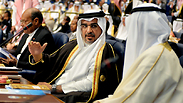
Arab League summit in Kuwait
צילום: AP
Arab League summit reveals disaccord among Arabs
Between Israel's 'apartheid system', the violent Egyptian crackdown on the Muslim Brotherhood and waning support of Syrian rebels, Arab leaders are having tough time choosing their battles.
Between Israel, Syria and sectarian tensions, the Kuwait summit of the Arab League has revealed massive inter-Arab differences on a range of topics vying to top the agenda in the international meet.
While Qatar's ruler criticized Iraq's Shiite-led government and Egyptian authorities in an address to the opening session of an Arab summit, others focused on Israel. Meanwhile the Gulf states decried the fact that the Syrian opposition was not given Syria's seat at the meeting, a move Saudi Arabia's Crown Prince Salman bin Abdel-Aziz, standing in for King Abdullah, said he was puzzled by.
The Arab League chief delivered the most scathing criticism of Israel, saying: "The Israeli occupation of Israel is equal to the apartheid system. It is the last stronghold of colonialism in the 21st century and runs against the progress of history," Nabil Elarabi told delegates.
Before him, Prince Salman said Israel's policies undermine any hope toward a peaceful settlement, including the construction of Jewish settlements and "insisting on the Jewishness of Israel."
Qatar's ruler Sheik Tamim bin Hamad bin Khalifa Al Thani also criticized fellow Arab leaders for not following through on a Qatari proposal made a year ago to set up a $1 billion fund to help the Arab residents of eastern Jerusalem, defiantly stating that his tiny but super-rich nation will go ahead with the $250 million it has already pledged.
A resolution to create the fund was adopted by last year's Arab summit held in Qatar.
Sheik Tamim also renewed calls for a small Arab summit to be held try to resolve differences between the militant Hamas group, which rules the Gaza Strip, and the Western-backed Fatah group in the West bank. Qatar supports Hamas.
Without naming Iraqi Prime Minister Nouri al-Maliki, Tamim criticized what he said were attempts to sideline entire segments of that Arab nation, a reference to Iraq's Sunni Arab minority.
Tamim also called on Egypt to start a "political dialogue," an implicit criticism of the crackdown there against the Muslim Brotherhood, the Islamist group that Qatar backs and of which Islamist President Mohammed Morsi is a member.
The military removed Morsi last July and there has been a massive crackdown against the Brotherhood, with the arrest of thousands. Estimates of the total dead in political violence since then also run into the thousands.
Morsi and leaders of the Brotherhood are in detention and some are in court on charges that carry the death penalty.
The criticism of Egypt is likely to further strain relations with Cairo at a time when Qatar's own relations with heavyweight Saudi Arabia, the United Arab Emirates and Bahrain – its partners in the Gulf Cooperation Council – are fraught with tension. Egypt and the three Arab nations have withdrawn their ambassadors from Qatar.
Qatar has reacted with dismay at the diplomatic gestures but insists it will push ahead with its own policies.
Qatari Foreign Minister Khalid bin Mohammed al-Attiyah has said his country will "follow a path of its own" and that the independence of its "foreign policy is simply non-negotiable."
Qatar, a US ally and home to one of Washington's largest military bases abroad, has in recent years played an outsized role in Arab affairs, spearheading efforts to resolve the Syrian crisis and mediating in some of Sudan's internal conflicts.
At the heart of Egypt's dispute with Qatar is its perceived support for Morsi. Cairo's government also blames the Qatar-based Al-Jazeera television network for inciting violence.
Saudi Arabia, Bahrain and the United Arab Emirates complain that Qatar meddles in their internal affairs by supporting the opposition – the Muslim Brotherhood in the case of Saudi Arabia and the Emirates.
They also want Qatar to stop supporting Shiite rebels in Yemen, an impoverished Arabian Peninsula nation that is of strategic significance to Saudi Arabia. And they want Qatar to make sure that its arms shipments to guerrillas fighting the Syrian government do not wind up in the hands of terrorists.
The representative of the Syria opposition, Ahmad al-Jarba, made a desperate plea for help from the Arab leaders.
"What we wanted and still want from you is a decisive position for support," he said. Opposition spokesman Louay Safi later told reporters on the sidelines of the summit that with the Syrian regime's perceived indifference to a negotiated settlement, Arab nations must fully support the opposition politically, economically and militarily.










